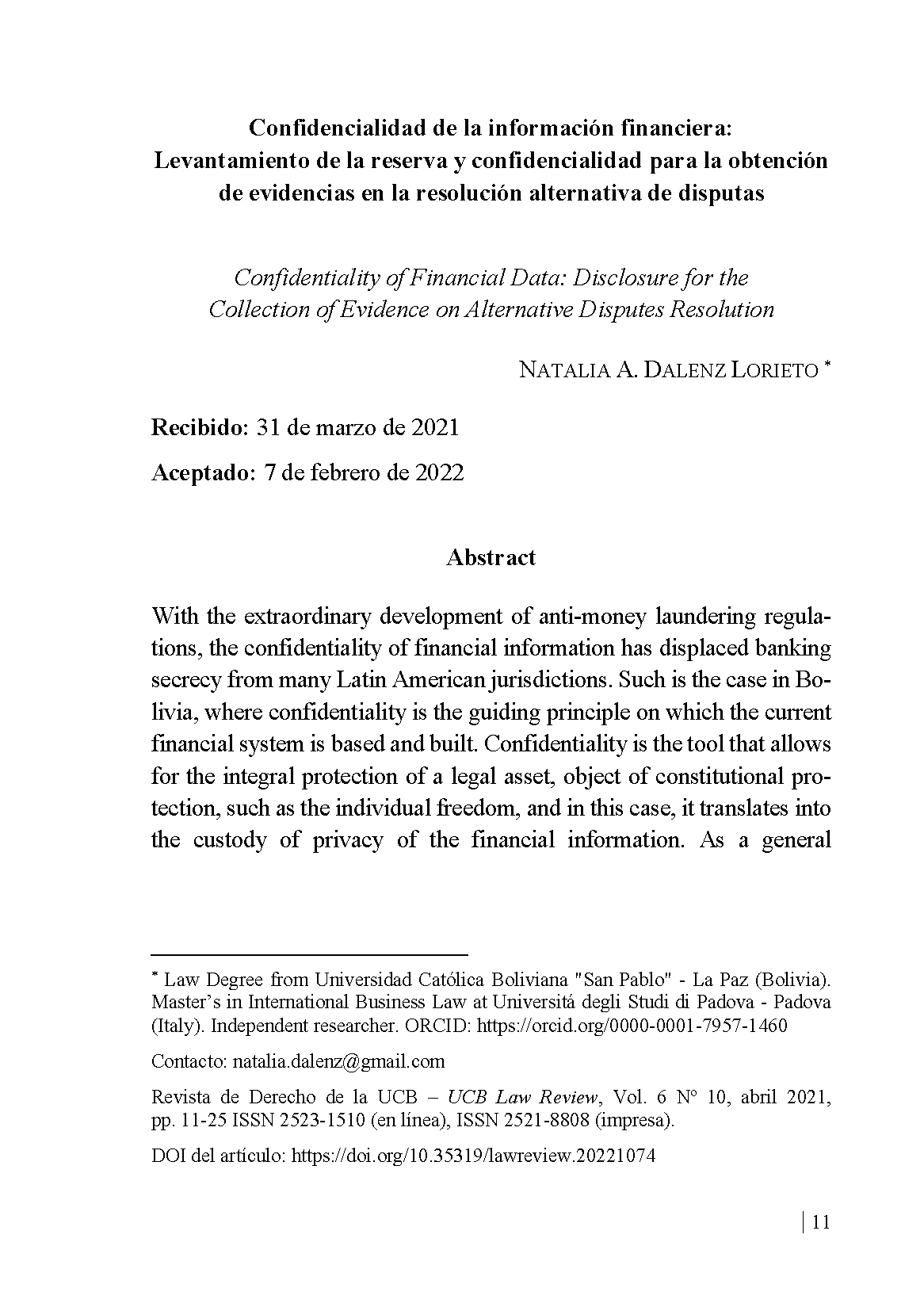Confidentiality of Financial Data: Lifting of Confidentiality for the collection of Evidence on Alternative Disputes Resolution
DOI:
https://doi.org/10.35319/lawreview.20221074Keywords:
money laundering, confidentiality, bank secrecy, Bolivia, financial system, constitutional protection, individual freedom, financial information, exceptions, evidence, in alternative dispute resolution processesAbstract
With the extraordinary development of anti-money laundering regulations, the confidentiality of financial information has displaced banking secrecy from many Latin American jurisdictions. Such is the case in Bolivia, where confidentiality is the guiding principle on which the current financial system is based and built. Confidentiality is the tool that allows for the integral protection of a legal asset, object of constitutional protection, such as the individual freedom, and in this case, it translates into the custody of privacy of the financial information. As a general principle, the regime of exceptions to this rule must be regulated by the principle of specificity, which is established by national law and must be interpreted restrictively. This article will analyze the applicability of the exception’s regime to the confidentiality of financial data for evidence gathering in alternative dispute resolution processes.
Downloads
References
Beltrán, M., Rifón, A. (2011) El Secreto Bancario en Uruguay el Mundo. [Tesis]. Universidad de la República- Uruguay.
Blossiers, J. (2012) El Secreto Bancario y el Lavado de Dinero. Dispo- nible en: http://derechogeneral.blogspot.com/2012/02/el-se-creto-bancario-y-el-lavado-de.html
Caratube International Oil Company LLP and Devincci Salah Hourani v. Republic of Kazakhstan (ICSID Case No. ARB / 13/13).
Compliance Instructions for Financial Intermediation Entities from the Financial Investigations Unit (2019).
Criminal Code, Bolivia (1972).
Dalenz, N. (2020) Acceso a la Información Bancaria para investigar Delitos de Corrupción. Revista Digital Guardiana.
Echeverría, A. (Sin fecha). El Sigilo Bancario- Acceso a la informa- ción Bancaria para Fines Tributarios. Disponible en: https://www.sii.cl/aprenda_sobre_impuestos/estudios/sigilo_bancario.htm
Financial Services Law No. 393, Bolivia (2013).
Godfrey, G., Newcomb, D., Burke, B., Chen, G., Schmidt, N., Stadler, E., Coucouni, D., Johnston, W. y Boss, W. (2016) Bank Con- fidentiality – A Dying Duty But Not Dead Yet? International Bar Association.
Hernández, R., Fernández, C., y Baptista, P. (2007). Metodología de la Investigación. 4ª.Ed. México: Mac – Graw Hill.
Herrero, J. (2007) Intimidad, tributos y protección de datos personales. Revista para el Análisis del Derecho, No.2.
Law Against Corruption and Illicit Enrichment and Investigation of Fortunes “Marcelo Quiroga Santa Cruz” (Law No.004) (2010).
Manual de Clasificación de la Información Pública – Uruguay (2020).
Regulation for the Security Management of the Information from the Authority for the Supervision of the Financial System (2017).
Villanueva, J., Arias, L. (2010) El secreto bancario. Aspectos históri- cos y problemática actual. Diálogos Revista Electrónica de Historia.
Vogler, R. (2006) Swiss Banking Secrecy: Origins, Significance, Myth. Association for Financial History.

Downloads
Published
How to Cite
Issue
Section
License
Copyright (c) 2022 UCB Law Review

This work is licensed under a Creative Commons Attribution-NonCommercial-ShareAlike 4.0 International License.
The U.C.B. Law Review is an Open Access Journal, therefore, it is full free for access, reading, search, dowload, distribution and lawfull reuse in any medium only for non-comercial purposes, provided the original work is properly cited.








